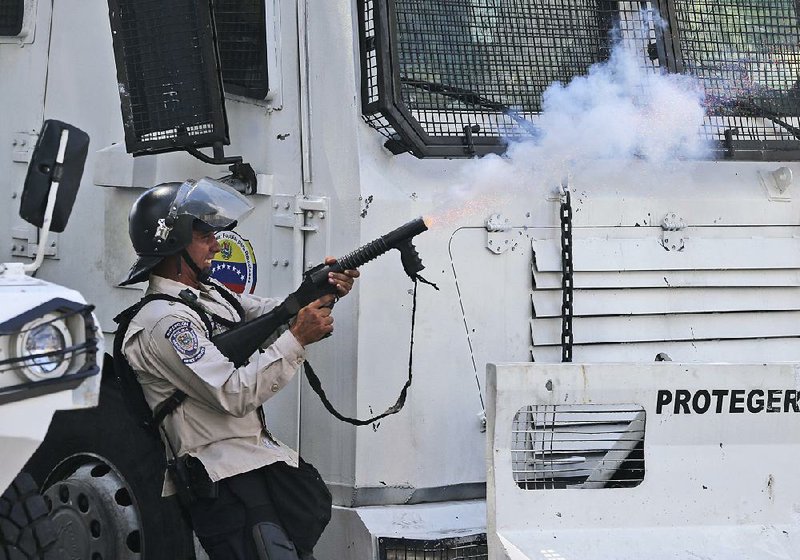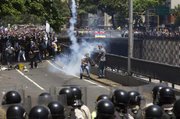CARACAS, Venezuela -- Venezuela's government fired tear gas and rubber bullets Saturday at some of the thousands of opponents of President Nicolas Maduro who poured into the streets of Caracas during a protest movement that began about a week ago.
The demonstrations in the capital and several other cities came a day after Maduro's government barred top opposition leader Henrique Capriles from running for office for 15 years.
Capriles' ban capped a tumultuous 10-day crackdown that saw pro-government groups rough up several opposition leaders and another seek refuge in a foreign embassy to escape arrest.
The protests were triggered by the Supreme Court's decision to gut the opposition-controlled legislature of its last vestiges of power, a move that was later reversed after widespread international condemnation and even dissent within Maduro's normally disciplined socialist leadership.
"Nobody can disqualify the Venezuelan people," an emotional Capriles said from a stage Saturday as he called on protesters to march downtown to the Ombudsman's office.
As the sea of protesters approached the headquarters of state-run PDVSA oil company, they were met by a curtain of eye-scorching tear gas and rubber bullets. Mayhem ensued, with riot police racing down windy streets, dodging objects thrown from tall apartment buildings as they deployed to squash the outbreak of unrest.
Later, a small group of youths unsuccessfully tried to set fire to a Supreme Court office building. The violence was condemned by the opposition leadership, who nonetheless blame Maduro's obstinacy for fueling the unrest.
The opposition leaders called for another protest Monday.
At least 17 people were treated for injuries, said Ramon Muchacho, a Caracas-area mayor where the demonstration took place.
Around most of Caracas, checkpoints were set up to search cars and frisk bus passengers even miles away from the clashes. As night fell, many streets still reeked of tear gas and a small group of youths burned trash and tore down street signs at busy intersections in eastern Caracas.
As the most dominant figure in the opposition over the past decade, Capriles has been at the forefront of the protests, the most combative since a wave of anti-government unrest in 2014, in which dozens of people were killed, many at the hands of security forces.
The two-time presidential candidate said Friday that the order stripping him of his ability to run in future elections only strengthened his resolve to resist on the streets.
"When the dictatorship squeals, it's a sign we're advancing," he said in a speech surrounded by other leading opposition figures, many of whom themselves have been targeted.
Opposition demonstrations in Venezuela in the past were sometimes planned weeks in advance to guarantee high turnout. But now the almost-daily churn of events in what's being called the "ongoing coup" -- the government's moves to accumulate more power -- has energized and united the normally fractious opposition.
While opposition leaders have insisted on peaceful protest, frustration and aggression built up over 17 years of polarizing socialist rule in Venezuela is running high on both sides.
As Saturday's march began, protesters snatched a camera from crew members working for pro-government state broadcaster VTV, chasing them away from the crowd with kicks and insults. In another intimidation tactic, police also posted on social media photos of protesters taken undercover with a request for information about the whereabouts of the unidentified "generators of violence."
Leaders in the ruling socialist party have accused the opposition of trying to provoke a bloodbath and its own coup. Maduro didn't comment Friday during an appearance on state TV about the comptroller general's order containing the ban on Capriles' ability to run. But he urged his supporters not to be distracted by tough language coming from "Capriloca," a play on the Spanish word for "crazy."
"The right wing's treason of our national interests is cause for indignation," Maduro said.
The protesters Saturday included Victoria Paez, 26. "Every day, the government gives us more reasons to leave our homes and protest," said Paez, who earns less than $20 a month as a chemical engineer. She said she's thinking about joining a sister and scores of college friends who have left the South American country seeking a better future.
A Section on 04/09/2017


